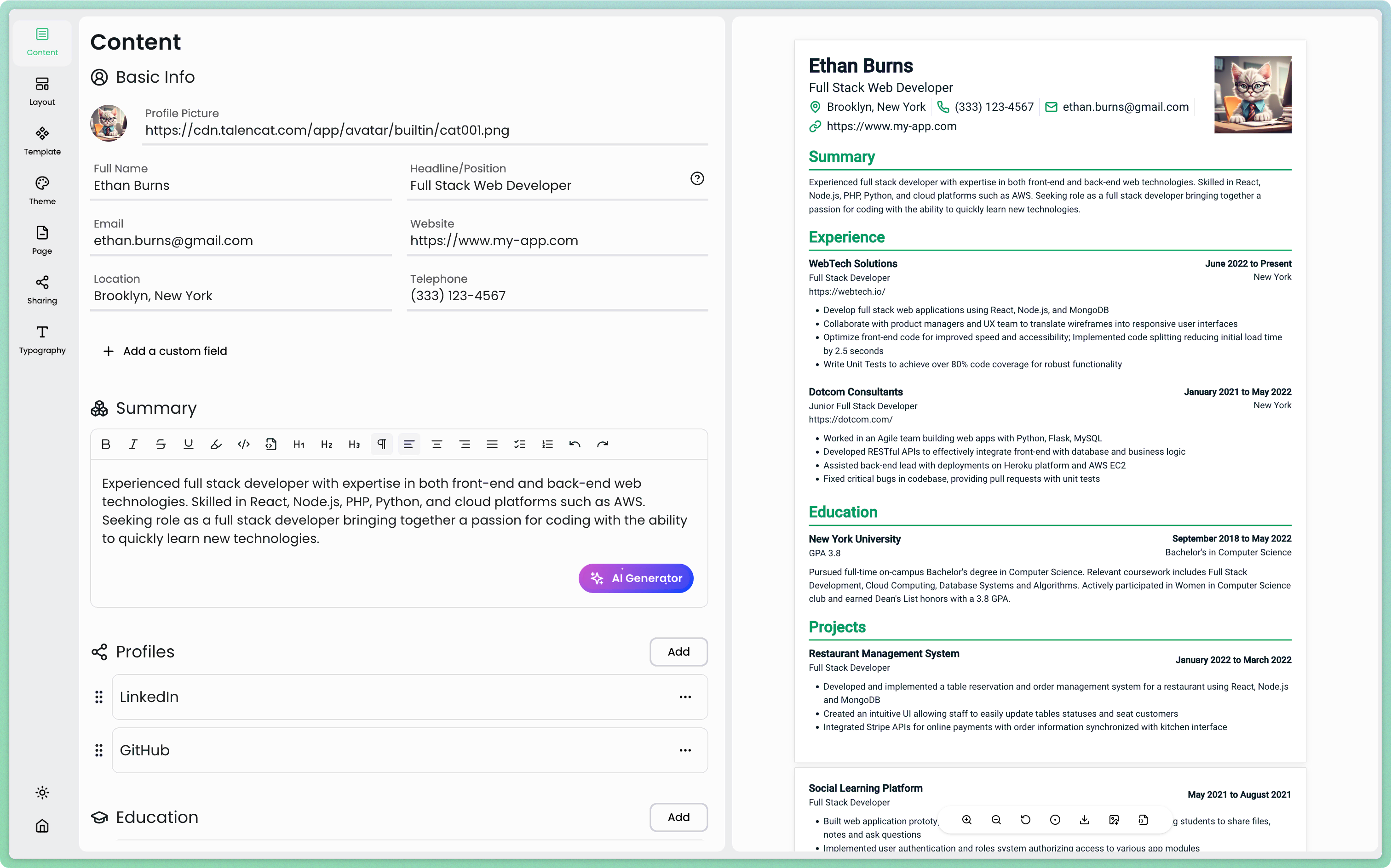In recent years, DevOps engineers have become more and more crucial in modern software development and IT operations. Do you get ready to be a DevOps engineer?
In this article, you will get an overview of the DevOps engineer position including its main responsibilities, roles, career path, skills, certificates, salary, and so on. And if you are going to apply for a DevOps engineer position, you will get the easiest solution to build a professional DevOps engineer resume.
Also Read:


Key Takeaways
-
DevOps engineers play a crucial role in modern software development and IT operations, bridging the gap between development and operations teams.
-
Key responsibilities include managing CI/CD pipelines, infrastructure as code, cloud computing, containerization, monitoring, security, and collaboration.
-
Essential skills include programming, version control, operating systems, networking, databases, cloud platforms, configuration management, and security knowledge.
-
The career path typically progresses from junior roles to senior positions, with opportunities to move into management or executive roles.
-
DevOps engineers are increasingly popular due to benefits like faster software delivery, improved collaboration, increased efficiency, better quality, cost reduction, and scalability.
-
While there's no standardized qualification, various certifications in cloud platforms, containerization, configuration management, and DevOps practices are valuable.
-
Salaries for DevOps engineers are competitive, with an average of $125,908 per year in the United States, varying based on location, experience, and skills.
-
For those looking to create a DevOps engineer resume, the article recommends using TalenCat CV Maker, an AI-powered resume editor with customizable modules and real-time preview.

Introduction to DevOps Engineer Job
A DevOps Engineer plays a crucial role in modern software development and IT operations.
What is A DevOps Engineer
A DevOps Engineer bridges the gap between software development (Dev) and IT operations (Ops), aiming to shorten the systems development life cycle while delivering features, fixes, and updates frequently in close alignment with business objectives.

Key Responsibilities of DevOps Engineer
- Continuous Integration/Continuous Deployment (CI/CD):
- Implement and manage CI/CD pipelines
- Automate build, test, and deployment processes
- Infrastructure as Code (IaC):
- Use tools like Terraform, Ansible, or CloudFormation to manage infrastructure
- Version control infrastructure configurations
- Cloud Computing:
- Manage cloud services (AWS, Azure, GCP)
- Optimize cloud resource usage and costs
- Containerization and Orchestration:
- Work with Docker for containerization
- Manage container orchestration platforms like Kubernetes
- Monitoring and Logging:
- Implement monitoring solutions (e.g., Prometheus, Grafana)
- Set up centralized logging systems (e.g., ELK stack)
- Security:
- Implement security best practices in the CI/CD pipeline
- Conduct security audits and vulnerability assessments
- Collaboration:
- Foster communication between development, operations, and other teams
- Participate in cross-functional projects
- Performance Optimization:
- Identify and resolve bottlenecks in development and deployment processes
- Optimize application and infrastructure performance
Skills and Knowledge that DevOps Engineers Should Have
From the above responsibilities, we can easily summarize what skills and knowledge a DevOps Engineer needs to have. The necessary skills and knowledge for DevOps Engineer are as follows:
- Programming: Proficiency in scripting languages (e.g., Python, Bash)
- Version Control: Git and related platforms (GitHub, GitLab)
- Operating Systems: Linux/Unix administration
- Networking: Understanding of TCP/IP, DNS, load balancing
- Databases: Knowledge of both SQL and NoSQL databases
- Cloud Platforms: AWS, Azure, or GCP certifications are often valuable
- Configuration Management: Tools like Ansible, Puppet, or Chef
- Containerization: Docker and container orchestration (Kubernetes)
- CI/CD Tools: Jenkins, GitLab CI, CircleCI, etc.
- Monitoring and Logging: ELK stack, Prometheus, Grafana
- Security: Understanding of cybersecurity principles and tools
Career Path of DevOps Engineers
DevOps Engineers often start as software developers or system administrators. They can progress to Senior DevOps Engineer, DevOps Architect, or move into management roles like DevOps Manager or Director of DevOps.
However, there are still some different levels of DevOps Engineers, the career path of a DevOps Engineer can typically progress as follows:
- Entry-level positions:
- Junior DevOps Engineer
- DevOps Analyst
- System Administrator (with DevOps focus)
- Mid-level positions:
- DevOps Engineer
- Site Reliability Engineer (SRE)
- Cloud Engineer
- Senior positions:
- Senior DevOps Engineer
- Lead DevOps Engineer
- DevOps Architect
- Management and leadership roles:
- DevOps Team Lead
- DevOps Manager
- Director of DevOps
- Executive positions:
- Chief Technology Officer (CTO)
- VP of Engineering
As DevOps Engineers progress in their careers, they often:
- Take on more complex projects and systems
- Gain deeper expertise in specific tools or technologies
- Develop stronger leadership and strategic planning skills
- Become more involved in high-level decision-making
- Focus more on optimizing processes and team performance
- Contribute to defining organizational DevOps strategy
DevOps Engineer is Becoming Popular!
With the rapid shift of modern software development and IT operations industries, DevOps Engineers are becoming more and more important. Because DevOps Engineers can bring many benefits to enterprises, helping them improve development efficiency and ensure service quality.
Faster delivery of software
DevOps practices enable organizations to release new features and updates more quickly and frequently. This speed is crucial in today's competitive market where rapid innovation is often a key differentiator.
Improved collaboration
DevOps breaks down silos between development and operations teams, fostering better communication and collaboration. This leads to more efficient problem-solving and a shared responsibility for the product.
Increased efficiency
Automation of repetitive tasks, a core principle of DevOps, significantly reduces manual work and human error. This leads to more efficient use of resources and time.
Better quality and reliability
Continuous integration and continuous deployment (CI/CD) practices, along with automated testing, help catch and fix issues earlier in the development process. This results in more stable and reliable software.
Cost reduction
By optimizing resource use, automating processes, and reducing downtime, DevOps practices can lead to significant cost savings for organizations.
Scalability
DevOps practices and tools make it easier to scale applications and infrastructure to meet changing demands, which is particularly important in cloud environments.
Improved customer satisfaction
Faster delivery of features and fixes, along with increased reliability, typically leads to higher customer satisfaction.
Competitive advantage
Organizations that can deliver high-quality software quickly and reliably often gain a significant edge over their competitors.
Cultural shift
DevOps promotes a culture of continuous improvement, learning, and shared responsibility, which can lead to higher job satisfaction and better outcomes.
Adaptability to market changes
The agility provided by DevOps practices allows organizations to respond more quickly to market changes and customer needs.
Certificates and Qualifications of DevOps Engineers
While there's no single standardized qualification for DevOps, there are several paths to becoming a DevOps engineer. Here are some common qualifications and certifications that are valuable in this field:
Educational background
- Bachelor's degree in Computer Science, Information Technology, or a related field
- Some roles may accept equivalent practical experience instead of a degree
Cloud certifications
- AWS Certified: AWS Certified DevOps Engineer
- Microsoft Certified: Azure DevOps Engineer Expert
- Google Cloud Certified: Google Cloud Professional DevOps Engineer
Container and orchestration certifications
Configuration management
CI/CD tools
Programming and scripting
- Various language-specific certifications (e.g., Python, JavaScript)
DevOps-specific certifications
- DevOps Institute certifications (e.g., DevOps Foundation, DevSecOps Engineering)
Agile and Scrum certifications
Security certifications
Networking certifications
It's important to note that while these certifications can be beneficial, practical experience and a demonstrated ability to implement DevOps practices are often more valuable to employers. Many successful DevOps engineers have a combination of relevant certifications, hands-on experience, and a track record of continuous learning.
The Salary of DevOps Engineers
According to the ZipRecruiter Database, the salary range for a DevOps Engineer is quite competitive in 2024. Yearly pay for a DevOps Engineer ranges from $34,000 to$179,500.

Here are some detailed statistics about DevOps Engineers' salary:
- Average salary:
- $125,908 per year
- $60.53 per hour
- Salary range:
- Low end: $34,000 per year / $16.35 per hour
- High end: $179,500 per year / $86.30 per hour
- Location comparisons:
- United States Average: $125,908 per year
- Los Angeles, CA: $132,480 per year
- Top paying cities:
- Sunnyvale, CA leads with $161,612 per year
- Other high-paying cities include Livermore, CA, and Redwood City, CA
- Factors affecting salary:
- Skill level
- Location
- Years of experience
- Job market:
- Described as "very active" in Los Angeles, CA
- California ranks 25th out of 50 states for DevOps engineer salaries
- Salary variation:
- 25th percentile: $50.72 per hour
- 75th percentile: $69.47 per hour
Build A DevOps Engineer Resume With TalenCat
TalenCat CV Maker is an AI-powered resume editor that provides a wide variety of built-in resume modules to maximize the customization of your resume. You can even add a custom section to customize more unique content for a professional DevOps engineer resume.
Anything you enter will be displayed on your resume in real time so that you can ensure your resume is all good!
Those who don't know how to build resume content effectively can utilize the generative AI function to improve the quality of content.

If you want to write an effective resume to apply for the DevOps engineer position, TalenCat CV Maker is definitely the best option for you.
Summary
DevOps Engineers play a crucial role in modern software development, bringing significant benefits to organizations through improved efficiency, collaboration, and software delivery. The field offers a promising career path with competitive salaries and opportunities for growth. While certifications are valuable, practical experience and continuous learning are equally important for success in this rapidly evolving field.




